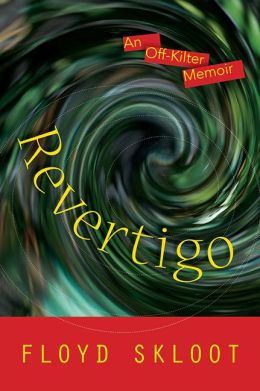Floyd Skloot has produced four books of essays over the past 11 years, each seemingly preoccupied with his illness and its effects on cognition, memory and motor response. A more market-minded writer would have written a commoditized illness memoir years ago and been done with it. But Skloot doesn’t write about illness as much as within it, a fateful province. Conclusion is not possible for such a narrative, which may be why Skloot has persisted with the essay, a delinquent genre that traditionally has strayed from the more methodical and systematized forms of conventional nonfiction.
 “I have never recovered what I lost in cognitive function 21 years ago,” he writes in “Anniversary Fever,” a piece in his sparkling new collection Revertigo. “Particularly in the realms of abstract reasoning, capacity to structure thought or visual stimuli, reliable word-finding ability, concentration, and memory … I feel compelled – driven – to grab whatever I can, however faint, and hold it in mind.”
“I have never recovered what I lost in cognitive function 21 years ago,” he writes in “Anniversary Fever,” a piece in his sparkling new collection Revertigo. “Particularly in the realms of abstract reasoning, capacity to structure thought or visual stimuli, reliable word-finding ability, concentration, and memory … I feel compelled – driven – to grab whatever I can, however faint, and hold it in mind.”
There are two underlying forces in play in Skloot’s essays: raw compulsion and acute judgment, sometimes severe. But illness is not the cause of the compulsion; it is simply the overruling condition and subject at hand. Similarly, the severity does not rule the art; it is an ancient anger reduced, as in cooking, to a sauce chilled before serving. The tone of the essays is unremittingly calm and considerate, often gently comical, but this is not the usual composure of the settled memoirist too eager to be present to the reader, to matter.
The Revertigo essays, mostly written after Skloot experienced a 138-day siege of severe vertigo in 2009, speak on many subjects: a Brooklyn and Long Island childhood and an “escape” to college, early experiences in theater, owning a first car (a Nash), reading and failing to finish novels, becoming a poet, Jules Verne, medical treatment, and travel through England. In the title essay, Skloot writes, “Though I may feel overwhelmed … there’s a crucial part of me where stability remains intact and available. The quiet center. And I know how to find it, how to lead myself there, where balance and harmony are to be found, even if I’m not aware that I’m doing so.”
A crucial, stable part, but not the only part. Without a surrounding turbulence a poet has nothing to do. And Skloot is primarily a poet who trades in placid surfaces that shimmer over hazardous shoals. But his equable, collected, and appreciative persona is not a trick of irony; it is an offsetting necessity for a complex psyche. Rilke famously wrote in Letters on Cézanne,, “Surely all art is the result of one’s having been in danger, of having gone through an experience all the way to the end, where no one can go any further.” From the outset, Skloot has presented himself as especially susceptible to danger. But allergic to excessive self-dramatization, he invites readers through the familiarity of tone to consider our individual harms. His illness shifts discreetly into a communal syndrome.
The preface to Revertigo echoes the most stunning assertion in his first book of essays, In the Shadow of Memory — childhood trauma had left him vulnerable to the brain-attacking virus that permanently disabled him in 1988. Citing research, he wrote, “A pattern of chemically based fear response becomes embedded in the brain’s structure, rendering a person incapable of anything but a chemical hyper-response to the least perceived danger … I think that the surprise, the unpredictability, the astonishing recognition that I was never safe, never able to trust my own mother or the moment I was living in, and the fright caused by the intimacy of her violence, were more damaging to my brain than any physical blows or abusive treatment she meted out.” In Revertigo, he reiterates: “Mine was not a world of fixed principles, firm beliefs, trustworthy foundations. It was a mercurial, eruptive, shape-shifting place, theatrical and often melodramatic, full of sudden harm, changes of fortune, changes of character. I never felt firmly grounded to the earth or connected to those around me, who so often seemed to morph into someone else.”
Striking back, the son dares to out-morph the mother. In “Senior Speech,” the high school lad attempts to erase his Brooklyn accent by developing a talent for mimicry and “a good ear” through the instruction of Mrs. Selma Sherman in senior speech class. Meanwhile, the father rises early to attend to his poultry market. The mother inflates with histrionic grandeur; the incommunicative and hard-working father plucks bloody feathers, hones his cleaver, and makes change. The son breaks away from the repudiated parents – but they take refuge and are remarried, on more affectionate and empathic terms, within the son. “I believed that cleaned-up speech would liberate me,” he writes, and indeed it has. But performicity and a sharpened edge are his inheritance.
 As it turns out, vertigo may be the most stable subject in Revertigo, a threshold to larger concerns more than an obstacle to trip over and rue. Skloot writes in the title essay, “The truth is, since the still world is always spinning, always in motion, our bodies and brains and minds work together to sustain the illusion of stability, to hold ourselves steady without thinking about it … But our hold is tenuous.” Each essay, then, is a grip-hold on a created self, the recurring “escape” from violence and hurt devised from memories spinning in the mind. This is why he says, “When I can access a memory, revisit a person or experience, it’s a kind of anniversary.”
As it turns out, vertigo may be the most stable subject in Revertigo, a threshold to larger concerns more than an obstacle to trip over and rue. Skloot writes in the title essay, “The truth is, since the still world is always spinning, always in motion, our bodies and brains and minds work together to sustain the illusion of stability, to hold ourselves steady without thinking about it … But our hold is tenuous.” Each essay, then, is a grip-hold on a created self, the recurring “escape” from violence and hurt devised from memories spinning in the mind. This is why he says, “When I can access a memory, revisit a person or experience, it’s a kind of anniversary.”
In “On Novels I Keep Trying and Failing to Read,” Skloot tries to explain why “a preference for concision and understatement are essential qualities of my taste in fiction.” Why is it that “Sophie’s Choice gets to me, then loses me”? Why does Styron’s “tonal and dramatic feverishness” become a wearying turn-off? Skloot flees from “elaborative style” and “authorial mannerisms” and prefers narratives more devoted to portraying “credible, personal lives.” But then, in “Something to Marvel At,” he talks about abandoning fiction altogether and turning toward nonfiction. “Either something was missing in the fiction I was reading, or something had changed in me.” Fortunately, refusing to rig an explanation for these ambiguities, he points instead to the “strong personal forces at work when we choose what to read,” forces often based on veiled impulses.
If you choose to read Revertigo, you will find what Skloot discovered when he began to organize the essays into a collection, namely that “disorientation was its dominant mode.” As with disorientation, the surroundings here appear to be concrete but uncertainty dominates – not the dubiousness of the heart but the mind and its memories.
[Published by the University of Wisconsin Press on March 17, 2014. 211 pages, $26.95 hardcover/$16.95 ebook]